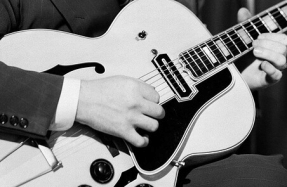
INTERVIEW
John Shanks is in his Los Angeles studio, and behind him the walls are adorned with rows of gold and platinum records that bear his name. As a producer he has consistently been making hit records for decades, emboldened by a finely developed curiosity for sound that started when he was a kid. He recalls listening to his parents’ Beatles records: “I remember finding the Balance knob and realising, almost suddenly, the drums were on one side, or the harmonies were on the other side, listening to parts more individually that made up the whole.”
Growing up in New York City it was hard to escape the barrage of influences that were all around. “There was always music playing out of cars, taxis, the park,” he says. “Then there would be my parents’ parties, these elaborate parties. You’re hearing Cole Porter and Gershwin and classical music.”
However, it was the guitar that really drew him into the world of music. “I was playing tennis rackets and anything when I was in first grade and saw the attention that I got pretending to be John Lennon or McCartney.” This eventually led to Shanks picking up his sister’s acoustic, which sat imposingly in a back room of the house.
At what point did that acoustic guitar become an electric?
“I had this acoustic probably from 10 to about 13 and then I wanted a Strat. My mom was great. She was like, ‘Save up your money and then wherever you get to, I’ll match you.’ She was awesome. So I worked summer jobs. I did whatever – walking dogs, working at a pharmacy, delivering medicine to old ladies. I went to this camp and I worked in the kitchen, scrubbing pots and cleaning tables and mopping floors. But I had this guitar in my head, this shining light on the hill. I remember, I think it was eighth grade, seventh grade, somewhere in there. I got to about 150, 160 bucks, and a new Stratocaster in ’75






